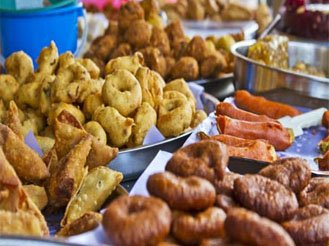9 Food Avoid Eating During Monsoons: The rains are here. Though they provide a respite from the scorching summer heat, they also bring along various ailments. Mostly, monsoon related diseases arise due to consuming unhygienic food and water. If you avoid this, you can prevent several diseases. Dr Puneet Nayak, CMD, PrettislimTM and Obesity Consultant, lists several foods which one should avoid eating during the monsoon season. Here’s the list.
9 Food Avoid Eating During Monsoons
Pakoras: Pakoras with tea is an irresistible snack during monsoons. However they are deep-fried which is unhealthy even if cooked at home. Humidity levels are generally high during the rainy season because of which body’s digestive ability is reduced. Therefore, avoid heavy and oily food as it can lead to an upset stomach. Pakoras sold outside are extremely unhygienic and harmful for consumption as one cannot keep control on the contents used.
One can opt to make pakoras at home in a hygienic way. But frequent consumption is harmful for health as they are deep-fried and tend to soak oil. Over indulgence of fried food lead to increase bad cholesterol and further leads to obesity and coronary diseases in long run. Regular consuming of oily snacks causes serious health issues.
Chaat: Chaat is another roadside snack every Indian loves to relish. Chaat that includes gol gappas, bhel puri, dahi puri might be made with contaminated water. Chances of usage of contaminated water while making these snacks are high leading to infections. The chutney used in this chaats also need not be hygienic if the water used is infected. These infections can lead to diseases like diarrhea or jaundice. Everything in chaat is not healthy, one can choose healthy options to make chaat at home to avoid infections from roadside food and making it home gives one an option to choose healthy ingredients too.
Kachori/Samosa: Samosas or kachori is also a much-loved snack option alongside evening tea during monsoons. Samosa stuffing can cause an upset stomach, acidity, diabetes, and obesity when consumed regularly. Another aspect of eating this snack from roadside is that they may be fried in oil stored for several months, makes them unhygienic, and an absolute dietary villain. One can try making these snacks using healthy alternatives like yam instead of using potato for the stuffing. Also, the upper crust can be made of whole wheat flour. But even then, eat in moderation.
Indo-Chinese: 9 Food Avoid Eating During Monsoons Street side Chinese food should be avoided be it any season. Chinese prepared during monsoon can be more harmful again due to usage of contaminated water and the dirt carried by flies on the road that gets in the food. High usage of artificial colours, ajinomoto, and stale oil is hidden with extra spices to make it look tasty and yummy. Today in India, every street has thelas selling Chinese food, it being cheap is consumed by people. Apart from falling prey to water borne and air borne diseases, it food can lead to health issues like shortness of breath, nausea, headaches, migraines, burning or tingling around the mouth, stomach ache, etc. Monosodium Glutamate could lead to all these health issues. Chinese food if prepared at home using healthy ingredients can avoid these health risks. Monosodium can be replaced by salt, one can use less spices, less oil to cook the food.
Leafy vegetables: It is a known fact the leafy vegetables are highly important for health. However, it is recommended to avoid consumption of leafy veggies during monsoon. The dampness, dirt and mud present in the leaves make these veggies susceptible to many germs, leading to different stomach infections. If it is musthave for someone, it is ideal to thoroughly wash them before cooking them.
Roadside juices: The juices sold on the road can be made out of stale fruits or fruits that are cut well in advance and have a good chance to get infected during monsoons. Likewise it is also necessary to avoid fruit salad sold on the road as they are cut in advance and may get infected. Prepare your juices at home using fresh fruits and consume instantly.
Sea food: Monsoon is the breeding season for fish and prawns, it is better to avoid seafood during monsoons. If it is essential to eat fish, chose fresh fish.
Carbonated drinks: Carbonated drinks reduce mineral levels in our body also reduce enzyme activity leading to indigestion. Hence it is better to avoid them, especially in monsoons, where digestion is already weak. Instead drink more water as sweat does not evaporate quickly in the monsoons which prevents our body from releasing heat. Therefore, keeping a bottle of water handy is always advisable. Also drink warm beverages such as ginger tea.
Precut or peeled fruits: It is better to avoid fruits which have been precut or peeled and kept in the open. Mangoes should be avoided once the monsoons start. Fruits like pears, peaches, plums, papayas and bananas should be consumed. Wash well before consuming. Nuts and seeds too can be had in small quantities.







